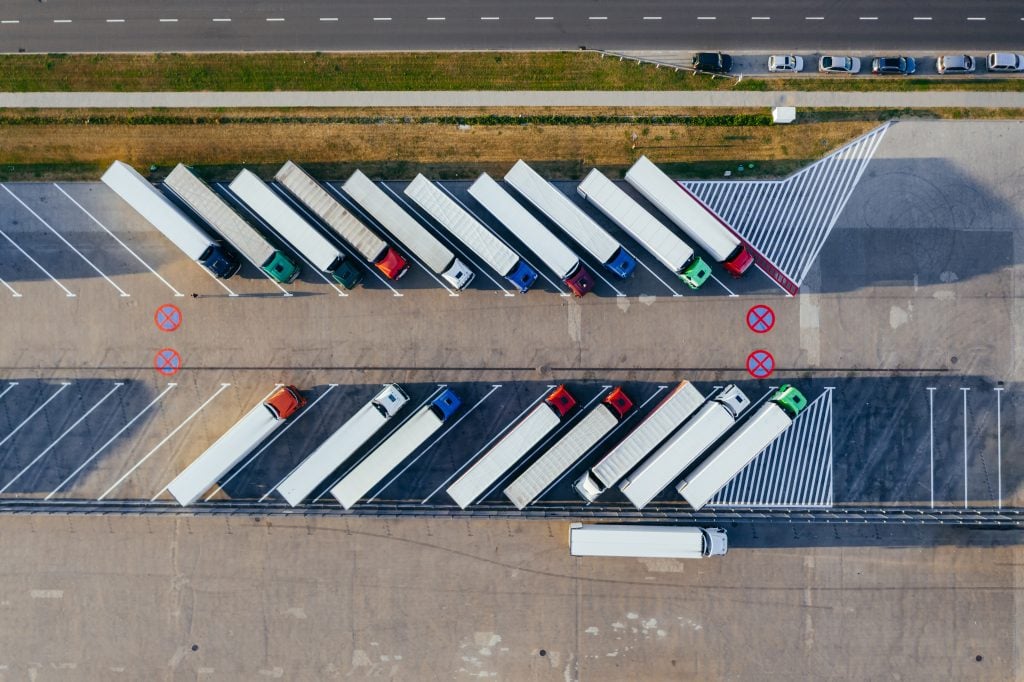अवश्य पढ़ें: व्यावसायिक प्रक्रियाओं के अनुकूलन के लिए स्मार्ट आपूर्ति श्रृंखला प्रबंधन समाधान


किसी भी व्यवसाय ने कई मुद्दों का सामना किया और उत्पादन के लिए धन अनुकूलन और कटौती लागत के नए तरीकों की खोज की। अनुकूलन के तरीकों के रूप में, कंपनियां वेबसाइटों, विपणन प्रौद्योगिकियों और ऐप के विकास के लिए यथासंभव अधिक ध्यान दे रही हैं। अभी भी आपूर्ति श्रृंखला की पैदावार में सुधार से कंपनी को और अधिक लाभ होने की संभावना है।
डिजिटल परिवर्तन समाधान
डिजिटल ट्रांसफॉर्मेशन दुनिया भर के व्यवसायों को अधिक कुशल और पारदर्शी बनाने में मदद करने जा रहे हैं। आधुनिक आपूर्ति श्रृंखलाएं पहले से कहीं अधिक सूचना और प्रौद्योगिकी तक पहुंच बना रही हैं, जिससे एक नई डिजिटल आपूर्ति श्रृंखला बन रही है। हालांकि, डिजिटल आपूर्ति श्रृंखला "स्मार्ट प्रौद्योगिकियों" के उपयोग के आधार पर तेजी से बढ़ी है, जैसे स्मार्ट सॉफ्टवेयर समाधान, इंटरनेट ऑफ थिंग्स (IoT), आर्टिफिशियल इंटेलिजेंस, बिग डेटा और, ब्लॉकचेन एक प्रदान करके विनिर्माण और रसद बदल रहे हैं दृश्यता के नए स्तर और समग्र संचालन में सुधार के अवसर।
स्मार्ट आपूर्ति श्रृंखला प्रबंधन सॉफ्टवेयर समाधान
आपूर्ति श्रृंखला प्रबंधन के लिए बहुत सारे अलग-अलग सॉफ्टवेयर समाधान हैं जो ट्रैकिंग, ओवरस्टॉक्स को नियंत्रित करने, पूर्वानुमान की मांग करने और इन्वेंट्री प्लानिंग प्रौद्योगिकियों और सुविधाओं को प्रदान करते हैं। इस प्रकार, जब एक कंपनी को लगता है कि आपूर्ति श्रृंखला प्रबंधन के लिए मौजूदा संसाधन पर्याप्त नहीं हैं, तो उसे स्मार्ट सॉफ्टवेयर समाधानों के लिए देखना चाहिए। ऐसी महत्वपूर्ण आवश्यकताएं हैं जो एक कंपनी को ध्यान देना चाहिए, जैसे कि कंपनी की प्रक्रियाओं में उपकरण के कार्यान्वयन का समय और उनके ईआरपी सिस्टम के साथ एकीकरण की संभावना। इसके अलावा, कंपनी के व्यवसाय के अनुसार सॉफ्टवेयर लचीलापन का स्तर एक महत्वपूर्ण भूमिका निभाता है। Streamline जैसी उपयोगिताएँ कंपनी की जरूरतों के अनुसार उद्देश्यपूर्ण निर्मित समाधान प्रदान करती हैं। यह सॉफ्टवेयर भविष्य की मांग का आकलन करके, इन्वेंट्री का अनुकूलन करके और जमी हुई पूंजी को जारी करके किसी भी आकार के व्यवसाय के प्रबंधन के लिए आवश्यक है। इसे स्पष्ट करने के लिए, Streamline समय श्रृंखला अपघटन, आंतरायिक मांग मॉडल और एक मानव जैसा निर्णय लेने वाला एल्गोरिथ्म का उपयोग करता है जो प्रत्येक उत्पाद के लिए उपयुक्त मॉडल का चयन करता है।
यह दृष्टिकोण अत्यधिक फिटिंग के लिए प्रतिरोधी है। यह अनियमित मांग को फिट करने की कोशिश नहीं करता है, लेकिन एक ही समय में, यह सभी स्पष्ट रूप से देखी गई निर्भरता जैसे मौसमी, रुझान और स्तर में बदलाव को पकड़ने में सक्षम है। Streamline का लक्ष्य सबसे सरल मॉडल चुनना है जो अभी भी डेटा में निर्भरता को कैप्चर करता है जो एक सटीक पूर्वानुमान का उत्पादन करने का एकमात्र तरीका है। मॉडल सादगी और डेटा फिट के बीच एक व्यापार बंद अंत में उच्चतम संभव सटीकता में परिणाम है।
एक स्मार्ट एससीएम समाधान आपको अपनी इन्वेंट्री की अद्वितीय दृश्यता प्रदान करना चाहिए, जिसमें लागत और दस्तावेज शामिल हैं, क्योंकि यह आपकी आपूर्ति श्रृंखला के माध्यम से चलता है। यह विवरणों का सबसे दानेदार स्तर भी प्रदान करना चाहिए और आपको अपवाद द्वारा मुद्दों का प्रबंधन करने की अनुमति देता है। और यह ठीक उसी तरह है जैसे Streamline काम करता है।
लॉजिस्टिक्स में इंटरनेट ऑफ थिंग्स (IoT) तकनीक
विभिन्न वेब-सक्षम उपकरणों को एक साथ जोड़कर परिचालन को सुव्यवस्थित करने के लिए व्यवसायों द्वारा उपयोग किए जाने वाले IoT। कृषि से लेकर विनिर्माण तक के व्यापार बाजार उत्पादन और परिवहन प्रक्रियाओं में प्रत्येक कदम पर मुद्दों का सामना कर रहे हैं। कई चुनौतियां हैं जो आपूर्ति श्रृंखला बना सकती हैं या तोड़ सकती हैं जैसे कि परिवहन में देरी, कार्गो की निगरानी, चोरी, ऑपरेटर की त्रुटियां, पुरानी आईटी विफलताएं। इन सभी कारकों से मुनाफे पर दबाव पड़ता है और लागत के दबाव में कमी आती है, जो कि कोई फर्क नहीं पड़ता।
विशेष रूप से जब यह पेरिहाबल्स की बात आती है, तो परिणाम नीचे की रेखा से परे होते हैं। हाल ही में आईओटी के अनुसार, सभी खराब होने वाले उत्पादन और उत्पादों का एक पूर्ण 30% खेत से मेज तक सभी तरह से इसे कभी नहीं बनाता है। यह बर्बादी का एक निराशाजनक मामला है और अभी भी एक दर्द बिंदु पर उच्च तकनीक को लागू करने का अवसर है जो बढ़ती आबादी और उन क्षेत्रों पर प्रभाव डालता है जहां खाद्य असुरक्षा अधिक चलती है।
उपरोक्त सभी तथ्यों को ध्यान में रखते हुए, एक जुड़े लॉजिस्टिक्स प्लेटफॉर्म का मूल्य प्रश्न से परे है। और अगली पीढ़ी की सफल आपूर्ति श्रृंखला प्रबंधन 1 टीटी 5 लॉजिस्टिक्स के रूप में जानी जाने वाली 4.0—will लीवरेज एज कंप्यूटिंग और इंटरनेट ऑफ थिंग्स (IoT) से वास्तविक समय में स्वचालित, भावना और प्रतिक्रिया प्रतिक्रिया तंत्र प्राप्त करने के लिए। यह साइबर सुरक्षा और प्रीमियम स्तर पर डेटा के सुरक्षित संचालन को भी जगह देगा। यह रसद संगठनों को आपूर्ति श्रृंखला प्रक्रियाओं के दौरान पारदर्शिता, दक्षता, रखरखाव, स्वचालन, माल ढुलाई सुरक्षा और लागत अनुकूलन को पूरा करने में सक्षम बनाता है।
मांग वाले सॉफ्टवेयर में आर्टिफिशियल इंटेलिजेंस
एआई आपूर्ति श्रृंखला को अंतिम उपयोगकर्ता के ठीक नीचे श्रृंखला में लगभग हर प्रक्रिया को सुव्यवस्थित करने की क्षमता प्रदान करता है जो व्यवसाय को वास्तविक समय के आंकड़ों के आधार पर एक साथ निर्णय लेने का अवसर देता है।
एआई की एक कुंजी सीखने और अनुकूलन करने की क्षमता है। गहरी सीखने की तकनीक का उपयोग करना, AI सावधानीपूर्वक और मानव त्रुटि-प्रवण प्रक्रियाओं के लिए एकदम सही है। इसे स्पष्ट करने के लिए, एआई डेटा का विश्लेषण करके और पिछली घटनाओं पर सीखकर स्टॉक स्तर की पहचान करने या ऑर्डर पूरा करने में सुधार कर सकता है। इसके अलावा, यह तकनीक गलतियों से सीखने के लिए बड़ी मात्रा में ऐतिहासिक डेटा का उपयोग कर सकती है। गलती होने पर दोबारा नहीं बनाया जाएगा। अनिवार्य रूप से, एआई बेहतर निर्णय अधिक तेज़ी से ले सकता है। आश्चर्यजनक परिणामों के लिए यह सुव्यवस्थितता आपकी आपूर्ति श्रृंखला में लागू की जा सकती है।
एक अन्य पहलू एआई में लॉजिस्टिक्स ऑप्टिमाइज़ेशन की काफी संभावना है। ड्राइवरलेस कारों के लिए इस तरह का स्मार्ट समाधान लागू किया जा सकता है जो मानव मजदूरों पर लीड समय और लागत को कम कर सकता है। इसके अलावा, ये वाहन अधिक कुशल हैं और मनुष्यों की तुलना में वाहन चलाते समय उच्च स्तर की सटीकता रखते हैं। टेस्ला, निसान और अन्य जैसे कुछ ड्राइवर रहित क्षमता वाले इलेक्ट्रिक सेमी-ट्रक को जारी करने पर कई कंपनियां काम कर रही हैं। इस तरह के नवाचारों की आपूर्ति श्रृंखला उद्योग में सामान्य रूप से परिवहन में क्रांति लाने की विशाल क्षमता है और यह विशेष रूप से अन्य आपूर्तिकर्ताओं को प्रभावित करेगा।

विनिर्माण में बड़ा डेटा दृष्टिकोण
बिग डेटा और एनालिटिक्स पहले से ही विनिर्माण को बेहतर बनाने में मदद कर सकते हैं। उदाहरण के लिए, बिजली की कीमतों में उतार-चढ़ाव का लाभ लेने के लिए ऊर्जा-गहन उत्पादन रन निर्धारित किए जा सकते हैं। विधानसभा परिचालनों में उपयोग की जाने वाली शक्तियों की तरह विनिर्माण मापदंडों पर डेटा या भागों के बीच आयामी अंतर, दोषों के मूल-कारण विश्लेषण का समर्थन करने के लिए संग्रहीत और विश्लेषण किया जा सकता है, भले ही वे वर्षों बाद हों। कृषि बीज प्रोसेसर और निर्माता प्रत्येक व्यक्ति के बीज की गुणवत्ता का आकलन करने के लिए वास्तविक समय में विभिन्न प्रकार के कैमरों के साथ अपने उत्पादों की गुणवत्ता का विश्लेषण करते हैं।
लाखों उपकरणों पर कैमरों और सेंसर के अपने नेटवर्क के साथ इंटरनेट ऑफ थिंग्स भविष्य में अन्य विनिर्माण अवसरों को सक्षम कर सकता है। अंततः, मशीन की स्थिति के बारे में लाइव जानकारी एक 3 डी-प्रिंटेड स्पेयर पार्ट के उत्पादन को ट्रिगर कर सकती है जो तब एक ड्रोन द्वारा एक इंजीनियर को मिलने के लिए संयंत्र में भेज दिया जाता है, जो भाग की जगह लेते समय मार्गदर्शन के लिए संवर्धित वास्तविकता चश्मा का उपयोग कर सकता है।
व्यापार अनुकूलन के लिए ब्लॉकचेन प्रौद्योगिकी
इस प्रसिद्ध प्रौद्योगिकी के कार्यान्वयन के कई अलग-अलग तरीके हैं। नाटकीय रूप से लेन-देन की लागत को कम करने के लिए प्रचार और बड़े वादे के अलावा, यथार्थवादी होने के लिए, ब्लॉकचेन प्रौद्योगिकी के पास एक विशाल बहुमत के लेनदेन के रिकॉर्ड और ट्रैक के लिए रसद में उपयोग करने की क्षमता है।
आजकल डेटा के साथ एक सबसे बड़ा मुद्दा इसके रिकॉर्ड और भंडारण की प्रक्रिया है। एक ओर, कंपनी के लेन-देन के बारे में जानकारी निजी तौर पर संग्रहीत की जाती है, जिसमें सभी गतिविधियों का कोई मास्टर लेज़र उपलब्ध नहीं होता है। दूसरी ओर, यह डेटा अक्सर कंपनी के विभागों या विशेष रूप से मजदूरों में आंतरिक रूप से वितरित किया जाता है, जो लेनदेन के समन्वय को एक समय लेने वाली और त्रुटि-रहित प्रयास बनाता है। इसके बजाय, एक ब्लॉकचेन प्रणाली में, लेनदेन सत्यापन या हस्तांतरण प्रक्रियाओं के लिए 3-पार्टियों को नियोजित करने की आवश्यकता नहीं है। इसके अलावा, ब्लॉकचैन-आधारित प्रणालियों में, सभी लेन-देन सेकेंड के भीतर सुरक्षित और सत्यापित किए जाते हैं क्योंकि बड़ी संख्या में समरूप डेटाबेसों में लेडर को दोहराया जाता है। परिणामस्वरूप, निकटतम भविष्य में ब्लॉकचेन लॉजिस्टिक्स में इन मुद्दों को दूर करने और आपूर्ति श्रृंखला प्रक्रियाओं में दक्षता बढ़ाने में मदद करेगा। इस प्रौद्योगिकी का उपयोग करने का मुख्य लाभ डेटा पारदर्शिता प्राप्त करना और मूल्य श्रृंखला के साथ संबंधित हितधारकों तक पहुंच प्राप्त करना है, इसलिए 'सत्य का एकल स्रोत' बनाना है।
सारांश
स्मार्ट आपूर्ति श्रृंखला प्रबंधन समाधान व्यवसाय प्रक्रियाओं के अनुकूलन और राजस्व बढ़ाने के लिए अवसरों की एक विस्तृत श्रृंखला लाते हैं। आपूर्ति श्रृंखला को बेहतर बनाने में एक स्मार्ट दृष्टिकोण बेहतर और स्मार्ट सॉफ़्टवेयर के साथ शुरू होता है, जो इन्वेंट्री पूर्वानुमान अंतराल को हल करेगा और मांग योजना में सुधार करेगा। जब उन कारकों का व्यवसाय के विकास पर गहन प्रभाव नहीं पड़ता है, तो गति और सटीकता को बदलने का बिंदु बन जाएगा। और IoT, AI, Big Data और Blockchain जैसी तकनीक कंपनी को बढ़ाएंगी और अधिक प्रक्रियाओं को आसान बनाएंगी। इसके अलावा, ये प्रौद्योगिकियाँ कंपनियों को सक्षम करेंगी और नाटकीय रूप से सेवा वितरण की प्रत्येक परत में दक्षता में सुधार करेंगी, लेकिन हमारे पास अभी भी एक लंबा रास्ता तय करना बाकी है। हमेशा याद रखें कि लॉजिस्टिक्स, इन्वेंट्री प्लानिंग और स्ट्रीमिंग प्रक्रियाओं के साथ सभी समस्याओं के लिए कोई एक जादू की गोली नहीं है, साथ ही जहां एक उपकरण सबसे अच्छा परिणाम देगा, दूसरे को कोई प्रयास नहीं करना होगा। आप जब तक कोशिश नहीं करते, सीख नहीं सकते।
क्या आप अभी भी Excel में योजना बनाने के लिए मैन्युअल कार्य पर निर्भर हैं?
स्ट्रीमलाइन के साथ आज ही मांग और आपूर्ति योजना को स्वचालित करें!
- इष्टतम 95-99%+ इन्वेंट्री उपलब्धता प्राप्त करें, यह सुनिश्चित करते हुए कि आप ग्राहकों की मांग को लगातार पूरा कर सकते हैं।
- 99% तक पूर्वानुमान सटीकता प्राप्त करें, और अधिक विश्वसनीय योजना और निर्णय लें।
- स्टॉकआउट में 98% तक की कमी का अनुभव करें, छूटे हुए विक्रय अवसरों और ग्राहक असंतोष को न्यूनतम करें।
- अतिरिक्त इन्वेंट्री को 50% तक कम करें, जिससे मूल्यवान पूंजी और भंडारण स्थान मुक्त हो जाएगा।
- मार्जिन में 1-5 प्रतिशत की वृद्धि, जिससे समग्र लाभप्रदता में वृद्धि होगी।
- एक वर्ष के भीतर 56 गुना तक ROI का आनंद लें, जिसमें पहले तीन महीनों में 100% ROI प्राप्त किया जा सकता है।
- पूर्वानुमान, योजना और आदेश देने में लगने वाले समय को 90% तक कम करें, जिससे आपकी टीम रणनीतिक गतिविधियों पर ध्यान केंद्रित कर सकेगी।


